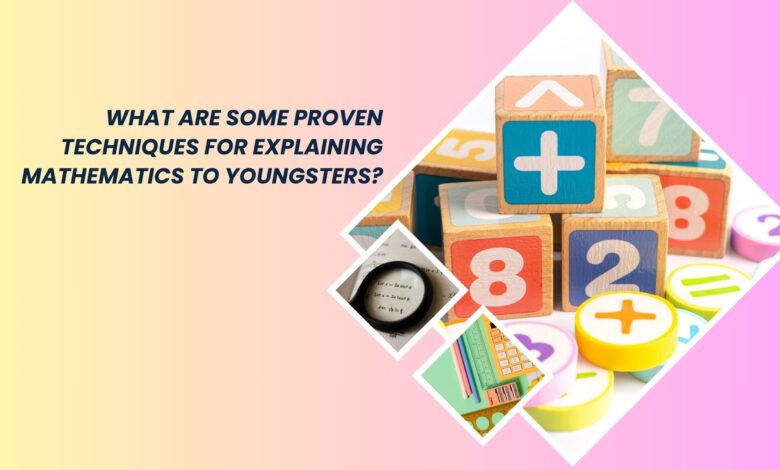What are some proven techniques for explaining mathematics to youngsters?

Both of you may find it distressing when your youngster has difficulty with mathematics. There are various tactics you can use to assist the way they learn, regardless of whether they are having trouble with simpler ideas or more complex subjects. You can even be inclined to look for answers online in the modern digital age by searching for services like “Take my online class for me“ or specially crafted mathematics services such as “Take my online math class for me.” Even though these easy solutions could sound good at first, it’s crucial to deal with the underlying issue and support your child in gaining a strong foundation in math. Put simply, you must instill a sense of importance in your youngster for practicing arithmetic. This can be achieved by outlining the importance of the practice, recognizing successful workouts, and even ensuring the routine enjoyable.
Tested strategies for math tutoring for children
These are several practical strategies to help your children overcome math difficulties.
Determine the Issue Domains
- Recognizing Particular Difficulties
Finding the precise areas in which your child is struggling is the first approach towards assisting them. Is it geometry, algebra, fractions, or simple arithmetic? Knowing the precise issue at hand will enable you to successfully modify your strategy.
- Make Use of Diagnostic Instruments
To identify your kid’s areas of failing, think about employing diagnostic tools and exams. Free math tests are widely available online and can give a thorough analysis of a student’s abilities.
Read also: How to Target the Right Audience with Online Market Research
Establish a Good Educational Setting
- Foster a Growth Attitude
Give your kids the mindset that practice and hard work will make them better. Celebrate their accomplishments and achievements, no matter how tiny, to help them adopt a growth mentality.
- Cut Down on Diversions
Make sure there are no outside distractions in your child’s study space. Their capacity to concentrate on arithmetic problems can be greatly improved by being in a calm, well-lit area.
Make Use of Internet Sources
- Web pages and Apps
Numerous internet tools are available for rendering math learning interesting and enjoyable. Online resources that provide interactive courses and practice problems.
- Online Tutoring
Employing an online tutor could be a more beneficial option if you’re thinking about using online services like take my online class for me. Customized tuition may give your child the one-on-one focus they require to understand challenging material.
Consistent Practice
- Practice Math Every Day
The secret to learning math is regular practice. Allow them to spend time on arithmetic problems for a short while each day. Frequent practice enhances skill and serves to reinforce knowledge.
- Make Use of Real-World Examples
Math can be applied practically in activities like food preparation, grocery shopping, and even some video games, which makes learning more engaging and fun.
Split Complicated Issues
- Make Steps Simpler
Instruct your youngster to divide difficult issues into smaller, more doable tasks. This may assist them comprehend the steps and make difficult activities appear more doable.
- Make Use of Visual Aids
Charting, which is diagrams, and graphs are examples of illustrations that might help your youngster comprehend complex concepts more easily. For those who learn best visually, sketching pictures or utilizing actual items can also be helpful.
Strengthen Foundational Ideas
- Boost Core Capabilities
Before introducing your child to more difficult subjects, make sure they have a firm grasp of fundamental math concepts. Comprehending the fundamental ideas is essential to solving more difficult issues.
- Utilize Repetitions
Repeating is an effective learning strategy. Basic skills should be practiced often to help your youngster gain confidence and reinforce their comprehension.
Promote Study Group for Research
- Study Groups
Learning sessions together can be quite productive. They give your child the chance to pick up knowledge from peers, share concepts with others, and see problem-solving from several angles.
- Mentoring among peer
If it’s feasible, set up a math-proficient friend to tutor your child. Children may discover it easier to relate to and seem more at ease studying from somebody close to their age.
- Introduce entertaining gadgets and activities.
- By means of interactive games
Everybody enjoys a good game, and many well-known board games as well as activities incorporate math.
Less complicated games like Candyland need counting abilities, but more complex versions like Monopoly require players to constantly add and subtract.
Use this chance to add a little additional arithmetic learning to household game night.
- Via Sporting
Another excellent way to use math in daily life is through sports.
Ask the restless youngsters to play an activity where they have to use the math concept you are currently working on in order to score points.
Players might deduct various point amounts from 100 instead of summing up their total points. To satisfy various math needs, you can experiment with alternative norms and value of points.
Make Use of Teachers
- Instructor Assistance
Urge your kids to ask their mathematics tutor for assistance. Instructors are able to offer extra materials, clarifications, and one-on-one assistance while or after school.
- Curriculum in Schools
Numerous educational institutions provide tutoring services or additional support initiatives after school. Use these tools to provide your child with extra help outside of scheduled lesson time.
Encourage introspection and writing
- Assign them a difficult task.
The adventure of learning arithmetic never truly finishes.
Regardless of how much knowledge you have, there will always be more to learn, and a few of the fresh skills and subjects can be very difficult.
It’s normal for your youngster to get disheartened as they tackle things that get harder and harder.
- Through constructive advancement
Get your student to consider how far they have come in order to help prevent this.
This will assist them in recalling that they have encountered difficulties in the past and that those difficulties were overcome with determination and dedication.
After they learn multiplying and adding will eventually make logical as well.
How to assist parents with arithmetic at home
Learners can benefit from math assistance from parents and instructors if they emphasize success and recognize their attempts to learn. There is really a thing as anxiety regarding mathematics, and it might lower your child’s drive. Your child can learn arithmetic with online tutors while also developing their self-worth.
The sole thought that crosses a parent’s mind when their child struggles in class is, “How can I help my child with math?” For this reason, we’ve already above mentioned some strategies to raise children’s academic performance. If you incorporate them into your everyday regimen, you should start seeing effects soon.
Why do certain children need to use different methods when learning math?
Since every child learns differently and at a different speed, some may find math’s mysterious concepts more difficult. Their difficulties may be caused by elements like intellectual growth, cognitive challenges, prior courses of study, or even psychological or behavioral problems.
Conclusion
While it may be alluring to look for short-term solutions, such as “Take my online math class for me”, it’s crucial to concentrate on for a long-time strategy that develop the youth’s mathematical abilities and trust.
You may assist your child in overcoming arithmetic obstacles and succeeding by recognizing areas for improvement, establishing an encouraging atmosphere for learning, making use of internet resources, practicing frequently, and cultivating a supportive mindset. Recall that your words of encouragement and backing can have a big impact on their educational path.






